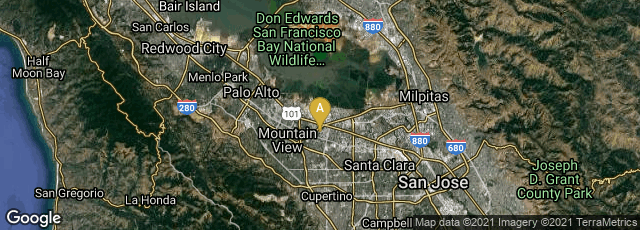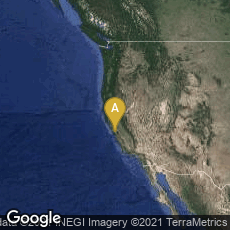

A: Mountain View, California, United States
On October 9, 2013 Sergey Brin, co-founder and technology president of Google published an Op-Ed piece regarding the Google Book Search program in The New York Times entitled, perhaps overly optimistically, "A Library to Last Forever," from which I quote without implied endorsement:
". . .the vast majority of books ever written are not accessible to anyone except the most tenacious researchers at premier academic libraries. Books written after 1923 quickly disappear into a literary black hole. With rare exceptions, one can buy them only for the small number of years they are in print. After that, they are found only in a vanishing number of libraries and used book stores. As the years pass, contracts get lost and forgotten, authors and publishers disappear, the rights holders become impossible to track down.
"Inevitably, the few remaining copies of the books are left to deteriorate slowly or are lost to fires, floods and other disasters. While I was at Stanford in 1998, floods damaged or destroyed tens of thousands of books. Unfortunately, such events are not uncommon - a similar flood happened at Stanford just 20 years prior. You could read about it in The Stanford-Lockheed Meyer Library Flood Report, published in 1980, but this book itself is no longer available.
"Because books are such an important part of the world's collective knowledge and cultural heritage, Larry Page, the co-founder of Google, first proposed that we digitize all books a decade ago, when we were a fledgling startup. At the time, it was viewed as so ambitious and challenging a project that we were unable to attract anyone to work on it. But five years later, in 2004, Google Books (then called Google Print) was born, allowing users to search hundreds of thousands of books. Today, they number over 10 million and counting.
"The next year we were sued by the Authors Guild and the Association of American Publishers over the project. While we have had disagreements, we have a common goal - to unlock the wisdom held in the enormous number of out-of-print books, while fairly compensating the rights holders. As a result, we were able to work together to devise a settlement that accomplishes our shared vision. While this settlement is a win-win for authors, publishers and Google, the real winners are the readers who will now have access to a greatly expanded world of books.
"There has been some debate about the settlement, and many groups have offered their opinions, both for and against. I would like to take this opportunity to dispel some myths about the agreement and to share why I am proud of this undertaking. This agreement aims to make millions of out-of-print but in-copyright books available either for a fee or for free with ad support, with the majority of the revenue flowing back to the rights holders, be they authors or publishers.
"Some have claimed that this agreement is a form of compulsory license because, as in most class action settlements, it applies to all members of the class who do not opt out by a certain date. The reality is that rights holders can at any time set pricing and access rights for their works or withdraw them from Google Books altogether. For those books whose rights holders have not yet come forward, reasonable default pricing and access policies are assumed. This allows access to the many orphan works whose owners have not yet been found and accumulates revenue for the rights holders, giving them an incentive to step forward.
"Others have questioned the impact of the agreement on competition, or asserted that it would limit consumer choice with respect to out-of-print books. In reality, nothing in this agreement precludes any other company or organization from pursuing their own similar effort. The agreement limits consumer choice in out-of-print books about as much as it limits consumer choice in unicorns. Today, if you want to access a typical out-of-print book, you have only one choice - fly to one of a handful of leading libraries in the country and hope to find it in the stacks." (http://www.nytimes.com/2009/10/09/opinion/09brin.html?scp=2&sq=sergey%20brin&st=cse, accessed 10-09-2009).